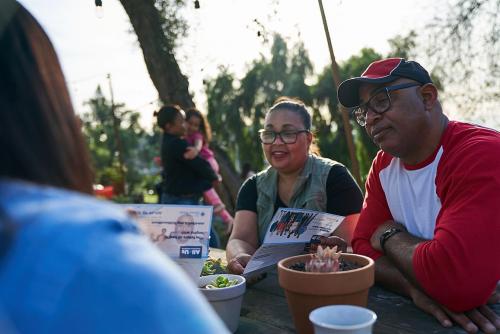All of Us Research Program to expand public engagement efforts with new partner awards
HCM Strategists and the University of Utah will help build community connections.
The All of Us Research Program, part of the National Institutes of Health, has awarded a combined $9.1 million in initial funding to two organizations to further the program’s extensive community engagement efforts. HCM Strategists, of Washington, D.C., and the University of Utah, Salt Lake City, will develop innovative approaches to educate communities and support enduring relationships with program participants.

ttendees at a community engagement event in San Diego, California, learn more about the All of Us Research Program.
“Many communities have been left out of research in the past, and we want to change that,” said Eric Dishman, director of the All of Us Research Program. “Beyond raising awareness, we want to gain participants’ trust and work together to speed up medical breakthroughs.”
HCM and the University of Utah will work alongside communities to develop engagement experiences that are scalable, customizable and available for use by the program’s national consortium.
“These awardees bring tremendous knowledge and a proven track record in community engagement, which will be critical in the program’s work to foster ongoing conversations with the public and build authentic relationships over time,” said Dara Richardson-Heron, M.D., chief engagement officer of the All of Us Research Program. “Our ultimate goal is a shared one—to improve health of all communities for the benefit of all people.”
All of Us is a landmark project that aims to enroll 1 million U.S. volunteers from all backgrounds to help create one of the world’s largest and most comprehensive biomedical research platforms. Participants will contribute different types of information over many years, through surveys, electronic health records, physical measurements, biosamples and wearable technologies. Information will be stored in a secure system, with safeguards in place to protect privacy, and made accessible to researchers for thousands of health studies. Their discoveries may lead to more personalized treatments and prevention strategies, what is known as precision medicine.
The program’s engagement activities to date have been substantial, contributing to early enrollment successes. More than 248,000 participants have joined so far, including more than 189,000 who have completed all the initial steps of the program. Of those, more than 80% come from communities that are historically underrepresented in research—racial and ethnic minorities, sexual and gender minorities, residents of rural areas, and other groups. Participants are involved in the program’s central governance and in local advisory groups of partner institutions nationwide.
Source: U.S. National Institutes of Health
- 248 reads
Human Rights
Ringing FOWPAL’s Peace Bell for the World:Nobel Peace Prize Laureates’ Visions and Actions

Protecting the World’s Cultural Diversity for a Sustainable Future

The Peace Bell Resonates at the 27th Eurasian Economic Summit

Declaration of World Day of the Power of Hope Endorsed by People in 158 Nations

Puppet Show I International Friendship Day 2020

